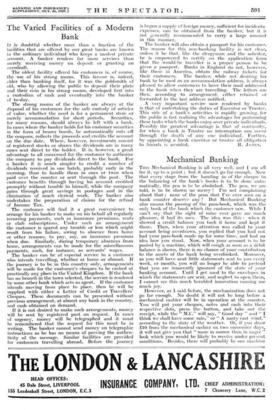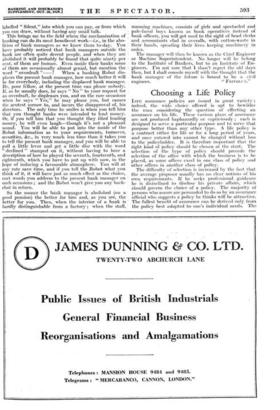Mechanical Banking
Tins Mechanical Banking is all very well, and I am all for it, up to a point ; but it doesn't go far enough. Now that every stage from the handing in of the cheque to the balancing of the bank's books is to be done auto- matically, the pen is to be abolished. The pen, we are told, is to be shown no mercy ! I'm not complaining about that ; none of the pens that I've ever seen on a bank counter deserve any ! But Mechanical Banking also means the passing of the pass-book, which was the only book of the bank which the customer saw. While I can't say that the sight of mine ever gave me much plea-Sure, it had- its uses. The idea was this : when it showed a credit balance you took it home and kept it there. Then, when your attention was called to your account being overdrawn, you replied that you had not had your pass-book made up for some time, and had no idea how you stood. Now, when your account is to 136 posted by a machine, which will cough as soon as a debit balance is shown, there is no chance of your contribution to the assets of the bank being overlooked. Moreover, as you will have neat little statements sent to you every week, or month, you will no longer be able to pretend that you are innocently ignorant of the state of your banking account. Until I get used to the envelopes in which the statements are sent, and neglect to open them, I cannot see this much heralded innovation causing me much joy.
However, as I said before, the mechanization does not go far enough. No doubt it will not be long before a mechanical cashier will be in operation at the counter. You will put your cheques, notes and cash into their respective slots, press the button, and take out the receipt, while the "M.C." will say, "Good clay" and "I think we shall have some rain," or " A nasty cast wind," according to the state of the weather. Or, if you draw £10 from the mechanical cashier on two successive days, it will not give you that "more in sorrow than in anger" look which you would be likely to receive under present conditiOns. Besides, there will probably be one machine labelled "Silent," into which you can pay, or from which you can draw, without having any small talk. This brings me to the field where the mechanization of , banking can .doits most beneficent work—i.e., in the abo- lition of bank managers as we know them to-day. You ' have probably noticed that bank managers outside the bank are often quite decent people, and when they are t abolished it will probably be fourxl that quite ninety per cent; of them are human. Even inside their banks some of them are occasionally almost genial, but mention the word "overdraft "—! When a banking Robot dig- places the present bank manager, how much better it will be for everybody, including the displaced bank manager. He, poor fellow, at the present time can please nobody. If, as he usually does, he says " No " to your request for an overdraft, he displeases you, and on the rare occasions when he says "Yes," he may please you, but causes the acutest sorrow to, and incurs the disapproval of, his directors. The only time he smiles is when you tell him that you thought banks were intended to lend money. Or, if you tell him that you thought they liked lending money, he will even laugh—though it's not a pleasant sound. You will be able to put into the inside of the Robot information as to your requirements, turnover, securities, &c., in very much less time than it takes you to tell the present bank manager, and you will be able to pull a little lever and get a little disc with the word "declined" stamped on it, without having to hear a description of how he played the seventh, fourteenth, and eighteenth, which you have to put up with now, in the bope of inducing a favourable atmosphere. You will at any rate save time, and if you tell the Robot what you think of it, it will have just as much effect as the choice, curt words -you address to the present bank manager on such occasions ; and the Robot won't give you any back- chat in return.
So the sooner the bank manager is abolished (on a good pension) the better for him and, as you see, the better for you Then, when the interior of a bank is hardly distinguishable from a factory ; when the staff, manning machines, consists of girls and spectacled and pale-faced boys known as bank operatives instead of bank officers, you will get used to the sight of head clerks and accountants clad in overalls, with cotton-waste in their hands, spending their lives keeping machinery in order.
The manager will then be known as the Chief Engineer or Machine Superintendent. No longer will he belong to the Institute of Bankers, but to an Institute of En- gineers. I'm not sure that I shan't regret the old days then, but I shall console myself with the thought that the bank manager of the future is bound to be a civil



















































 Previous page
Previous page